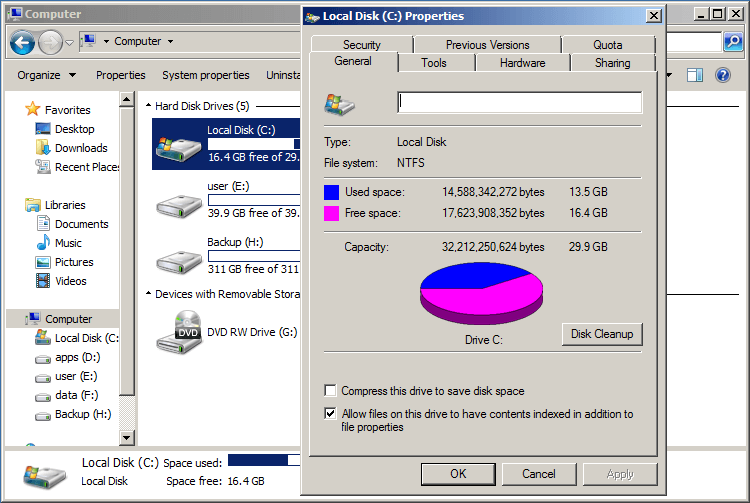
- #Clean disk c windows 7 professional install
- #Clean disk c windows 7 professional update
- #Clean disk c windows 7 professional full
- #Clean disk c windows 7 professional windows 10
It's easy to forget that several gigabytes of old data can sit in your Recycle Bin. While this might be obvious to you, we're including it in case some aren't aware. This is a special place where deleted files are kept until you permanently delete or restore them. Whenever you delete a file on your system, Windows sends it to the Recycle Bin. The Recycle Bin is a unique folder-while it appears under your C:\ drive, this is protected by Windows and you don't need to access it that way.

Temporary files: As their name suggests, temporary files aren't used for anything in the long term, so you can erase them without worry.Just make sure there's nothing inside it that you need. Recycle Bin: While you can empty the Recycle Bin through its own window, you can also do it easily here.Language resource files: If you've previously downloaded another language or keyboard layout that you don't use, this will let you easily erase it.You can erase these if you haven't had errors related to upgrading Windows to a new version.
#Clean disk c windows 7 professional update
#Clean disk c windows 7 professional full
This isn't a full guide to the Disk Cleanup tool, so we're not going to look at every entry in the menu. Click Temporary files in the list of options, then you'll see a list populate that's similar to what Disk Cleanup offers.
#Clean disk c windows 7 professional windows 10
If you find this interface too clunky, you can browse to Settings > System > Storage to try the newer storage cleanup tool in Windows 10 and 11. For more options, choose Clean up system files and provide administrator permissions before you go through the list. Let it scan, and you'll see several categories of files you can erase. You can open it by searching for Disk Cleanup in the Start menu and selecting a drive ( C: in most cases). The Disk Cleanup tool helps you reclaim disk space on your Windows computer and is simple to use. This helps you avoid common Windows maintenance mistakes, like accidentally deleting files that you need or messing with the wrong folders.įREE CHEAT SHEET: Organize Your Computer Files Like a Pro

After this your path variable should look like this: the short form.Before we look at Windows files and folders you can safely remove, you should know that manually deleting them isn't usually the best way to go about it.Īside from wasting time doing this yourself when you could automate the process, it's safer to let the Disk Cleanup tool do these cleanings for you. If you (for whatever reason) like to use the npm version bundled with node, add the direct path to your global Angualr CLI version.This will load the npm version installed with npm (and not with node) and with the installed Angular CLI version.

#Clean disk c windows 7 professional install
The clue (on Windows only) is to arrange the entries in the path variable right.īecause the installer puts C:\Program Files (x86)\nodejs before C:\Users\\AppData\Roaming\npm on your PATH, it will always use version of npm installed with node instead of the version of npm you installed using npm -g install your path variable will look something like: Since this question is still asked over and over again one year later I will post my answer here as well.


 0 kommentar(er)
0 kommentar(er)
